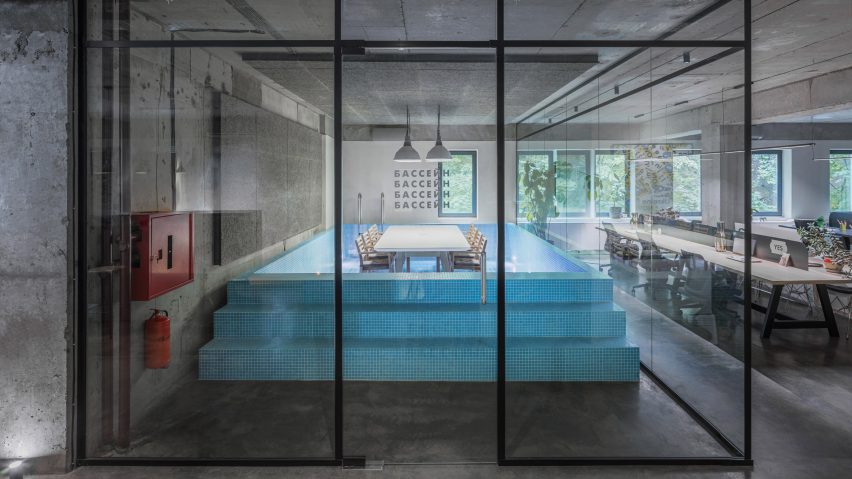Ukraine is finding its place on the global design stage with multi-disciplinary studios that blur the boundaries between architecture, interiors and furniture. Here are six studios to watch.
Yuriy Zimenko
Interior and furniture designer Yuriy Zimenko has been active on the Kiev scene for 15 years. Known for his luxurious and minimal style enlivened with moments of colour, he has designed apartments and houses in his home country and abroad.
Zimenko's furniture designs are defined by their sense of humour. The form of the Roomy Wardrobe Numbers Game is decorated with a series of gold numbers, that thin out towards the top of the piece.
His Op-art furniture range includes a cupboard, chest and coffee table. Each piece has two contrasting layers, a plywood exterior with perforated holes covering a matte black base to provide a striking visual effect.
The collection is inspired by the 20th-century art movement in which geometric shapes take on an optical form.
Balbek Bureau
Headed by Slava Balbek, architecture, interiors and design firm Balbek Bureau also encompasses furniture brand Propro, which primarily caters to offices.
The studio also runs a side project within the company called Tuyvo, which works on design for social good for the surrounding community, such as providing benches for a local park with an integrated solar panel.
Recent projects have included designing the Kiev headquarters of Ukraine-founded software company Grammarly, which occupies the top two floors of a 14-storey block in the city centre.
Balbek created versatile spaces with nooks for private working and a variety of recreational areas, a conference hall, nap pods, and even a soundproof music room. Other projects include Bursa hotel and the Syndicate clothing store in the capital.
Ryntovt Design
Architecture, interior and furniture design studio Ryntovt, based 300 miles east of Kiev in Kharkiv, has been in business for 25 years. Environmental and social responsibility is central to the company's ethos.
The studio's furniture is often made from hard wood such as walnut, ash, acacia, beech and oak and plays to the strengths of the particular material.
Many of the pieces have veneers in contrasting timber applied across the surface in decorative patterns to emphasise the different qualities of the wood.
"Eco-design for us is not only the use of natural materials, but eco-sense, eco-love, eco-life in general," said the studio. "Our furniture is as unique as the structure and the texture of the wood that we use in production."
Sergey Makhno
Despite describing themselves as primarily an architecture practice, Sergey Makhno also works across interiors and product design.
Makhno started out by designing a cafe for a friend, now his eponymous studio has completed more than 600 projects in 16 countries. The studio has recently been commissioned to design the Ukranian Museum of Modern Art.
Sergey Makhno's interiors projects tend to have an exposed, post-industrial feel with statement lighting features making a big impact.
Many of their architecture projects have pitched roofs and raised block forms with glazed surfaces for maximum light, with one project including a two-storey bookcase.
The product design branch of the company stretches from its Elephant upholstered furniture with outsize forms to lights with rough, organic exterior surfaces, such as the recent Crust collection, with large-scale shades made from raku ceramics that give a textured aesthetic.
Fild
Kiev brand Fild has designed company headquarters and apartments, as well as home accessories like lights, hooks, trays and shelving. They have even branched out into branding for fashion label Podolyan and jewellery label Samokish, and a local yoga studio and salon.
Established in 2013 by Dan Vakhrameyev and Kateryna Fedorenko, the company opened its first store in December 2016 in a building with a grey facade and bright yellow door, to match the company branding. A few months later they became the first Ukrainian brand to present at the Stockholm Furniture Fair.
"Fild is built on the principles of clean minimalist lines and shapes of objects, in graphic design as well as in interior design," said the brand. "The team bases their perception on laconic design, convenient application and pleasant textures."
Faina
Also based in Kiev, Faina is a design brand that Victoriya Yakusha founded in 2014 with the aim to update traditional Ukrainian design and make it better known outside the country. The studio's office interior has been longlisted for the small workspace interior category in this year's Dezeen Awards.
"With the feelings of sincere love for my national roots, I decided to make the Ukrainian national identity understandable and recognisable throughout the world," said Victoriya Yakusha.
"Through my product design Faina collection, I want to reflect the whole life force of energy that has been encapsulated over the Ukrainian land for centuries – as I feel it, in a modern interpretation."
Unusual materials in furniture design, including clay, wood, willow and flax, are used to make furniture items, with willow woven into lamp shades and clay used for cabinet doors and thick table legs.
Meanwhile, the Ztista collection is formed by covering a metal frame with flax, applied in organic shapes. The structure is then overlaid with a biopolymer coating for a durable, waterproof surface.

